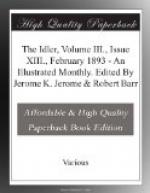Last year on November Eve—the night when the Fairies have power, and the dead wake and dance reels with them—the blind beggarman started out from the Farm. An Atlantic gale was shattering seas against the Cliffs, the air was salt with foam, and throbbed with the pulse of the breakers. Bridget tried in vain to stop him; he said the “Little Good People” were calling him. She watched him disappear into the darkness, the whimpering of his fiddle died into the shrieks of the wind. “’Tis a quare divil, he is,” she said, “God help him!”
Once in the night she thought she heard a snatch of the “Fairies’ Reel”; but Andy never came back. Next morning they found Bonaparte whining on the edge of the Cliffs; there was no sign of his master. He must have gone over the Cliffs in the darkness, but the waves gave no token.
Some folk in Moher believe that the Fairies took back their child, and that the old blind fiddler lives now in the Kingdom of Tyrnanoge, and makes music for their dances in that enchanted country where the old grow young and the blind see. Some say that he still haunts the Cross-roads, and only a week ago, Larry Ronan, coming back at night from Ennistimon Fair, saw a black shadowy figure under the black trees, and heard a heart-broken voice cry “Remember the Dark Man!” Larry’s natural surprise at this accounted for his being found next morning asleep in the ditch. But it is agreed in Moher that Andy left life on November Eve, whether he became the playfellow of the Fairies or the plaything of the waves.
* * * * *
CHURCH AND STAGE.
A REVIEW OF HENRY IRVING,
BY THE REV. DR. JOSEPH PARKER.
WITH ILLUSTRATIONS FROM F. BARNARD AND J. BERNARD PARTRIDGE.
[Illustration: MR. IRVING AS “HAMLET.” (From the Portrait by EDWIN LONG.)]
[Illustration: MR. IRVING AS “DIGBY GRANT” IN “TWO ROSES.”]
The innumerable reviews of Mr. Irving by literary and artistic experts have left room enough for an amateur estimate by a man who is accustomed to regard human life mainly from a religious standpoint. A complete review of the Stage by the Pulpit could hardly be the work of a single pen; for my own part, therefore, I can only make a very small contribution to such a review by indicating a few points which have occurred to me in the study of one particular actor. At once, however, the question arises, Is Mr. Irving a man who can be thus summarily characterised? In a dramatic sense, are there not many Mr. Irvings? When a man can act “The Two Roses” and “The Dead Heart” with equal effect, when he can at will be as vulgar as Robert Macaire, or as dignified as Cardinal Wolsey; when he can be either as young as Hamlet or as old as Lear, the inquiry as to his plurality becomes natural and pertinent. For my part, I rank Mr. Irving the comedian above Mr. Irving the tragedian, just as I




